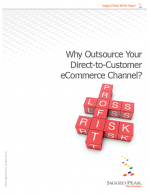Why Outsource Your Direct-to-Customer eCommerce Channel?
To better focus on their core competencies, more and more manufacturers recognize that outsourcing is an effective and economical way to manage their direct-to-customer (D2C) eCommerce channel.
Successful Online Selling Depends on Logistics
While traditional retail sales have remained flat, online sales have experienced steady double digit growth over the past few years.
These figures promise a rich market for online companies, yet many are unprepared to meet the demands of this growth.
As eCommerce sales increase so can the cost and complexity of effectively managing the online channel.
Forrester Research, a leading technology and market research company, conducted a survey of eCommerce companies and identified global distribution, rising customer expectations, fulfillment costs, and the logistics of moving large volumes of small parcels as the major challenges facing the industry.
“The eCommerce boom risks being halted by logistics chaos,” the report indicates.
Consider these statistics:
- More than half of eCommerce companies lose money on each order.
- Manufacturers who start their D2C channel by developing an in-house program typically end up with costs in excess of 38-40% of their gross margin.
- One in every five orders is delivered late according to the customer’s expectations.
- 35% of all companies expect to see increased export sales as a result of eCommerce.
- 41% of companies see fulfillment as a barrier to eCommerce growth.
An effective and economical solution
It is highly recommended that organizations considering outsourcing run the numbers to determine exactly what they can save.
In order to gain economies of scale, Forrester Research advises that mid-sized eCommerce companies (average of 1,000 orders per day) outsource their order management, logistics and fulfillment services.
When online merchants use an outsourcing partner they have the ability to share back office systems, warehouse space, and human resources with other companies, typically allowing orders to be fulfilled for less than 10 percent of revenue.
Some of the benefits of outsourcing are that it allows companies to:
- Increase profitability and improve gross margins by sharing infrastructure costs
- Concentrate resources on growing your business by eliminating non-core functions
- Reduce logistics and shipping costs by leveraging 3PLs
- Enhance customer service levels through access to the latest technology
- Lower information technology (IT) investment and support costs with a SaaS model
The opportunity to reduce costs and increase profitability has convinced many companies to outsource their direct-to-customer channel even when their sales volume is sufficient to cover the expense of running the operation in-house.
What’s Related



Favorites





